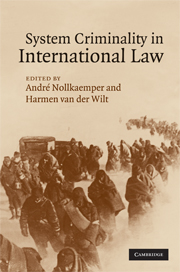Book contents
- Frontmatter
- Contents
- Preface
- Table of cases
- Table of treaties and international instruments
- List of abbreviations
- List of contributors
- 1 Introduction
- 2 The policy context of international crimes
- 3 Why corporations kill and get away with it: the failure of law to cope with crime in organizations
- 4 Men and abstract entities: individual responsibility and collective guilt in international criminal law
- 5 A historical perspective: from collective to individual responsibility and back
- 6 Command responsibility and Organisationsherrschaft: ways of attributing international crimes to the ‘most responsible’
- 7 Joint criminal enterprise and functional perpetration
- 8 System criminality at the ICTY
- 9 Criminality of organizations under international law
- 10 Criminality of organizations: lessons from domestic law – a comparative perspective
- 11 The collective accountability of organized armed groups for system crimes
- 12 Assumptions and presuppositions: state responsibility for system crimes
- 13 State responsibility for international crimes
- 14 Responses of political organs to crimes by states
- 15 Conclusions and outlook
- Index
6 - Command responsibility and Organisationsherrschaft: ways of attributing international crimes to the ‘most responsible’
Published online by Cambridge University Press: 08 October 2009
- Frontmatter
- Contents
- Preface
- Table of cases
- Table of treaties and international instruments
- List of abbreviations
- List of contributors
- 1 Introduction
- 2 The policy context of international crimes
- 3 Why corporations kill and get away with it: the failure of law to cope with crime in organizations
- 4 Men and abstract entities: individual responsibility and collective guilt in international criminal law
- 5 A historical perspective: from collective to individual responsibility and back
- 6 Command responsibility and Organisationsherrschaft: ways of attributing international crimes to the ‘most responsible’
- 7 Joint criminal enterprise and functional perpetration
- 8 System criminality at the ICTY
- 9 Criminality of organizations under international law
- 10 Criminality of organizations: lessons from domestic law – a comparative perspective
- 11 The collective accountability of organized armed groups for system crimes
- 12 Assumptions and presuppositions: state responsibility for system crimes
- 13 State responsibility for international crimes
- 14 Responses of political organs to crimes by states
- 15 Conclusions and outlook
- Index
Summary
Introductory remarks
The increasing trend to prosecute and punish international crimes and criminals, to fight against the widespread impunity for gross violations of human rights, with the means of (international) criminal law (see para. 4 of the preamble of the ICC Statute) is certainly to be welcomed and has received broad support in the academic literature, including by this author. At the same time, however, one must not lose sight of the fundamental principles of criminal law which are the product of centuries’ long fights for fairness and the rule of law and which must not be ignored by the international criminal tribunals, especially the International Criminal Court (hereinafter ‘ICC’).
Indeed, from a national criminal law perspective, rooted in the tradition of enlightenment, there exists a tension between International Criminal Law (hereinafter ICL)/international criminal jurisdiction and national criminal law/domestic jurisdictions at least in two respects. On the one hand, the increasing trend to criminalization, especially in its extreme form promoted by certain NGOs as prosecution and punishment at whatever cost, often conflicts with the traditional criminal law principles grounded in the rule of law (Rechtsstaat). To a lesser extent, the criminalization efforts at the international level may conflict with decriminalization efforts at the national level, either by a reduction of the substantive criminal law (downgrading criminal offences to mere administrative infringements of the law) or by procedural means using the wellknown techniques of procedural discretion, abbreviations of criminal proceedings or various forms of negotiations (guilty plea, conformidad, pattagamiento, transactie, etc.).
- Type
- Chapter
- Information
- System Criminality in International Law , pp. 127 - 157Publisher: Cambridge University PressPrint publication year: 2009
- 8
- Cited by



